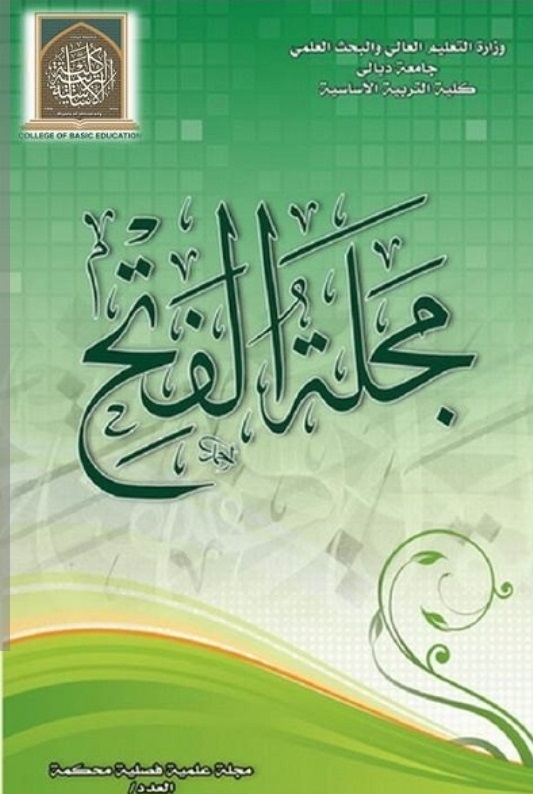اثر استخدام نظرية التعلم المستند على الدماغ في تطوير اكتساب المفردات للطلبة العراقيين دارسي اللغة الانكليزية لغة اجنبية في المدارس الثانوية
الكلمات المفتاحية:
نظرية التعلم المستند الى الدماغ ، اكتساب المفرداتالملخص
يهدف البحث التحقق من آثر استخدام نظرية التعلم المستند الى الدماغ في تطوير اكتساب المفردات للطلبة العراقيين دارسي اللغة الانكليزية لغة اجنبية في المدارس الاعدادية. وللتحقق من الهدف صيغت الفرضية الصفرية : "(لا يوجد فرق ذو دلالة إحصائية عند مستوى دلالة ( 0,05 ) بين متوسط درجات الطلبة في المجموعة التجريبية الذين درسوا باستخدام نظرية التعلم المستند الى الدماغ ومتوسط درجات الطلبة في المجموعة الضابطة الذين درسوا وفق الطريقة الاعتيادية في الاختبار البعدي لاكتساب المفردات". تبنت الباحثة التصميم التجريبي للضبط الجزئي للمجموعتين التجريبية والضابطة تضبط أحدهما الاخرى ذات الاختبار البعدي في اكتساب المفردات. أجريت هذه التجربة على عينة تتألف من (85 طالبة). وحددت الدراسة على صف الرابع اعدادي في ثانوية العدنانية في مدينة بعقوبة. وكانت العينة تشمل 43 طالبة في المجموعة التجريبية و41 طالبة في المجموعة الضابطة. بعد ذلك تم التأكد من تكافؤ المجموعتين من خلال العمليات الاحصائية التي تشمل مجموعة من المتغيرات مثل: العمر وتحصيل الوالدين ودرجاتهم في امتحان اللغة الانكليزية للعام الدراسي 2023-2024. تم تصميم كلا الاختبارين (القبلي والبعدي) وخطة الدرس من قبل الباحثة. وتم التأكد من صلاحية وصدق الادوات، بعرضهما على الخبراء في مجالات طرائق تدريس اللغة الانكليزية وعلم اللغة، وتم التأكد من ثبات الاختبار من خلال معادلة كودر رتشردسون والتي كانت (0.86). وبعد الانتهاء من التجربة حللت الباحثة البيانات احصائيا" باستخدام t test , توصلت الباحثة إلى وجود فروق ذات دلالة إحصائية بين المجموعتين (التجريبية والضابطة) في مهارة اكتساب المفردات في نتائج الاختبار البعدي ولصالح المجموعة التجريبية.
وخلصت الباحثة إلى أن استخدام نظرية التعلم المستند الى الدماغ قد حفز الطلاب وأثار اهتمامهم وزاد من مشاركتهم في أنشطة اكتساب المفردات، وجعل الطلاب أكثر ثقة واستقلالية ودافعية وهذا يعكس قدراتهم على الأداء بشكل أفضل. وأوصت الدراسة المدرسين بضرورة اعتماد نظرية التعلم المستند الى الدماغ في تدريس اللغة الإنجليزية من خلال توفير بيئة مريحة منخفضة التهديد.
المراجع
References
Al-Bazzaz, A. H. (2005). "Investigating the Impact of Vocabulary Instruction on Developing Reading Comprehension". Unpublished M. A. Thesis, University of Tikrit.
AL-khazaly, Husam , (2013), “the application of certain techniques for promote Iraqi EFL students’ vocabulary storage and long-term retention”. Unpublished M.A. Thesis, Al-Mustansiriya University.
Basu, R. (2004). Implementing Quality: A Practical Guide to Tools and Techniques. New York: Cengage Learning.
Bender, M. (2013). Academic Vocabulary and Reading Comprehension. New York: Cengage Learning.
Brown, H. D. (2001). Teaching by Principles: An Interactive Approach to Language Pedagogy. New-York: Longman.
Caine, G., & Caine, R. N. (1999). Making connections: Teaching and the human brain. Alexandria, Virginia, Association for Supervision and Curriculum Development.
Caine, G., & Caine, R. N. (2000). The learning community as a foundation for developing teacher leaders. NASSP Bulletin, 84, (616), 27-34.
Caine, G., & Caine, R. N. (2002). Making connections: Teaching and the human brain. Menlo Park, CA: Addison-Wesley.
Cooper, J. D. and Kiger, N. D. (2009). Literacy: Helping Students Construct Meaning (7th ed.). Boston: Houghton Miflin Company.
Duman, B. (2010). The effects of brain-based learning on the Academic Achievement of students with different learning styles. Eric Journal of Education Sciences, 10 (4), 2077-2103.
Eder, K. (2006). Vocabulary Learning Strategies. Berlin: Grin Verlag Publishing.
Gatti, W. J. (2004). ꞌꞌThe Effect of Developing Iraqi Learners’ EFL Vocabulary Repertoire Through Semantic Relations on Their Reading Comprehension Abilityꞌꞌ.Unpublished M.A. Thesis, Al-Mustansiriya University.
Hans, V. (2018, May 21). Study of the day: mild dehydration alters mood, makes thinking hard. The Atlantic. Retrieved on 20/07/2019 from https://www.theatlantic. com/health/archive/2012/02/...dehydrati.../ 253320/
Immordino-Yang, M. (2011). Implications of affective and social neuroscience for educational theory. Educational Philosophy and Theory, 43 (1), 98-103.
Jancke, L. (2018). Every individual has a unique brain anatomy, study reveals. Retrieved on 20/07/2019 from https://neurosciencenews.com/uniquebrain-anatomy-9541
Kinach, B. M. (2010). A review of “how the brain learns Mathematics. The Journal of Educational Research, 103:5, 368-369.
Krysik, J. L. and Finn, J. (2013). Research for Effective Social Work Practice (3rd ed.). New York: Routledge Publishing.
Lado, R. (1961). Language testing: The construction and use of foreign language tests: A teacher’s book. Bristol, Inglaterra: Longmans, Green and Company.
Mehrens, W. A., & Lehmann, I. J. (1991). Measurement and evaluation in education and psychology (2nd ed.). New York, NY: Houghton Mifflin Company.
Schmitt, N. (1997). Vocabulary learning strategies. In N. Schmitt, & M. McCarthy (Eds.), Vocabulary: Description, acquisition and pedagogy (Vol. 2035, pp. 199-227). Cambridge, England: Cambridge University Press.
Stevens, J. & Goldberg, D. (2001). For the learners’ sake. Tucson, Zephyr Press.
Thomas, B. M. & Swamy, S. S. (2014). Brain-based teaching approach–A new paradigm of teaching. International Journal of Education and Psychological Research. 3 (2), 62-65.
Thornbury, S. (2002). How to Teach Vocabulary. Harlow: Longman.
Ur, P. (1996). A Course in Language Teaching. Cambridge: CUP
Wilson, L. O. (2018, October 2). The Brain-based education - An overview- The second principle. Retrieved on 20/07/2019 www.thesecondprinciple.com/optimallearning /brainbasededucation-anoverview.
التنزيلات
منشور
كيفية الاقتباس
إصدار
القسم
الرخصة
الحقوق الفكرية (c) 2025 مجلة الفتح للبحوث التربوية والنفسية

هذا العمل مرخص بموجب Creative Commons Attribution 4.0 International License.
حقوق النشر والترخيص
تطبق مجلة الفتح للبحوث التربوية والنفسية ترخيص CC BY (ترخيص Creative Commons Attribution 4.0 International). يسمح هذا الترخيص للمؤلفين بالاحتفاظ بملكية حقوق الطبع والنشر لأوراقهم. لكن هذا الترخيص يسمح لأي مستخدم بتنزيل المقالة وطباعتها واستخراجها وإعادة استخدامها وأرشفتها وتوزيعها ، طالما تم منح الائتمان المناسب للمؤلفين ومصدر العمل. يضمن الترخيص أن المقالة ستكون متاحة على نطاق واسع بقدر الإمكان وأن المقالة يمكن تضمينها في أي أرشيف علمي.
لمزيد من المعلومات، يرجى متابعة الرابط: https://creativecommons.org/licenses/by/4.0/.


